The News published a slightly toned down version of my article, The Feb 12 pledge. Un-edited text below, followed by a postscript linking this struggle to Malala. More photos at this link.
Renewing the Feb 12 pledge
By Beena Sarwar
Every February 12 we commemorate Pakistan Women’s Day in honour of those who gathered at Lahore’s Regal Chowk on that day in 1983, defying the military order against public gatherings, to protest Gen. Zia’s ‘Law of Evidence’ that upheld the testimony of a male as equal to that of two females in a court of law. The police attacked the demonstrators with batons and arrested several, including the venerated poet Habib Jalib whom Chief Minister Punjab Shahbaz Sharif is fond of quoting.
It’s been a long fight and it’s far from over. The Taliban’s terms put forward as a precondition to talks with the elected government of Pakistan come straight from the trajectory begun in the Zia years. Only they are taking it further, aiming to impose an even more extreme version of the Wahabi-inspired ideology and legal system that Gen. Zia introduced.
I visualise the late General looking down from the skies at his handiwork, like the Cheshire Cat who faded away, its grin being the last to disappear.
The Taliban want ‘Sharia’ in Pakistan, and an ‘Islamic’ system’ to be imposed on the land of the pure, a noble quest that has claimed over 50,000 civilian lives and over 10,000 armed forces personnel over the past decade.
The question is, whose Sharia? How can you impose religious laws on a diverse population where every community has its own interpretation of the same religion?
“Keeping in view the several definitions given by the ulama (about who is a Muslim), need we make any comment except that no two learned divines are agreed on this fundamental,” wrote Justice Munir and Kayani after questioning dozens of ulema (religious scholars) for their Report of the Court of Inquiry constituted under Punjab Act II of 1954 to enquire into the Punjab Disturbances of 1953.
The inquiry “found that if the fatwas of the ulama are relied upon to determine whether a sect is Muslim or kafir, then no sect at all will be left which could be called Muslim.”
Lest we forget, the Law of Evidence was among a series of laws that Gen. Zia imposed in the name of Islam. He had become a devout Muslim who needed to prove his Islamic credentials in order to lead the ‘jihad’ in Afghanistan at the behest of Washington against the Soviets.
Another law he imposed was the Hudood Ordinance, including the Zina (adultery) law that made sex outside marriage a criminal offence, and rape a private offence. A woman who had been raped had to prove her innocence or be accused of adultery.
The number of women in prison skyrocketed from 70 in 1979, to 6,000 in 1988, with Zina complaints comprising the majority of cases against women and girls. Some women were whipped. However, the higher courts overturned all the sentences of stoning to death that some lower courts prescribed — due process that the Taliban don’t recognise.
When the Federal Shariat Court ruled the punishment of death by stoning is not Islamic (PLD 1981 FSC 145 Hazoor Baksh), Gen. Zia changed the bench. The new judges upheld the punishment. Even the Council of Islamic Ideology has termed these laws flawed and in need of review.
My Special Report for Geo TV, 2003, on the Hudood Ordinance
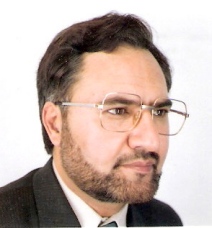 Dr M. Farooq Khan, the respected doctor and Islamic scholar from Mardan, called the Hudood laws “the biggest insult to Islam”. In 2010, the Taliban killed him for his views, that they considered un-Islamic. Other reputed religious scholars have had to flee the country lest they meet a similar fate.
Dr M. Farooq Khan, the respected doctor and Islamic scholar from Mardan, called the Hudood laws “the biggest insult to Islam”. In 2010, the Taliban killed him for his views, that they considered un-Islamic. Other reputed religious scholars have had to flee the country lest they meet a similar fate.
The Qisas and Diyat law allows murderers to go scot-free if the victim’s family ‘forgives’ them or accepts blood money. This is the law that was invoked to allow the American contractor Raymond Davis, who had killed two Pakistanis, to go free. The ‘blasphemy’ law is blatantly misused, so much so that even the CII has urged its review.
The military dictator who started this has long gone. The fight is now against the dark forces he unleashed and nurtured. They have grown and multiplied over the decades, encouraged until recently by the Pakistani establishment.
In the name of Islam, they attack unarmed civilians including women and children. They trample on graves, behead soldiers and civilians and play football with their heads.
This is not a version of Islam we can accept. We refuse to be bullied in the name of religion.
As we commemorate Pakistan Women’s Day on February 12, 2014, there was never more urgency in renewing the pledge to continue the fight for our rights.
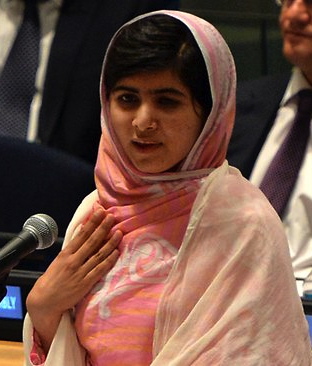 Postscript: The Malala connection
Postscript: The Malala connection
Decades later, if we can trace the trajectory of the Taliban as stemming from Gen. Zia’s ‘Islamization’ policies, we can also trace the trajectory of the women’s protest to the fight that Malala Yusufzai, the global icon for the right to education, has come to symbolize.
Malala, who turns 17 this year, began speaking up at age 11 for the right of girls to education. Her anonymous blog on the BBC after the Taliban overran Swat Valley in northern Pakistan where she lived touched people the world over. She has become a symbol of resistance against the Taliban, for whom this basic right is anathema.
In 1983 when Pakistani women first came out on the streets in public protest, traditional resistance to girls’ education was wearing down. Even today, the primary hesitation in sending girls to school surfaces when there are no schools nearby, or if there is a lack of female teachers or sanitary facilities. When the facilities exist, even the hesitations those who resist the idea of girls being educated are often overcome.
The Taliban, who tried to kill Malala in 2012, want to take forward the controversial ‘Islamisation’ agenda that Gen. Zia set in motion. Washington had propped up Gen. Zia in order to counter the Russians in Afghanistan. Their strategy of turning the Afghans’ war of national liberation into an Islamic ‘jihad’ or holy war, against the “god-less Communists” made Pakistan the frontline state in this war. America entrusted Pakistan’s security establishment with training and conditioning fighters – then known as ‘mujahideen’ or holy warriors – to wage this war in the name of Islam.
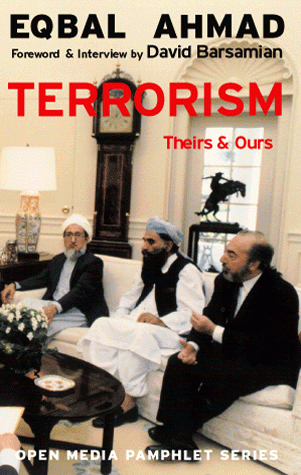 In the 1990s, the Taliban – students of the seminaries in Pakistan where the Mujahideen were trained, stepped into the power vacuum in Afghanistan. The Taliban, a mutant variant of the Mujahideen, enforced a brutal system of retributive justice they said was “Islamic”. Arbitrary punishments included flogging, amputations, beheading – punishments that continue to be practiced in Saudi Arabia, the seat of Wahabi Islam, the source of these extremist views. (See Eqbal Ahmad’s lecture ‘Terrorism, Theirs & Ours‘; original audio/video here)
In the 1990s, the Taliban – students of the seminaries in Pakistan where the Mujahideen were trained, stepped into the power vacuum in Afghanistan. The Taliban, a mutant variant of the Mujahideen, enforced a brutal system of retributive justice they said was “Islamic”. Arbitrary punishments included flogging, amputations, beheading – punishments that continue to be practiced in Saudi Arabia, the seat of Wahabi Islam, the source of these extremist views. (See Eqbal Ahmad’s lecture ‘Terrorism, Theirs & Ours‘; original audio/video here)
By the time America routed the Taliban in Afghanistan, another military dictator held sway in Pakistan. Army chief Gen. Pervez Musharraf, who in 1999 overthrew the previous elected government, unlike Gen. Zia, was secular and “liberal”. But he allowed the Frankenstein’s monster of ‘jihadis’ running amok in Pakistan, to continue operating. They were useful to needle India. Under pressure from Washington, Musharraf withdrew support from the Afghan Taliban (‘bad’) but turned a blind eye (at least) to Pakistan’s local militants (‘good’), ignoring their linkages to the Pakistani Taliban and Al Qaeda.
Gen. Zia’s ‘Islamisation’ policy has come full circle. The Taliban and their aligned groups aim to impose the same Wahabi-inspired ideology and legal system that Gen. Zia introduced, that Pakistani women have been protesting against since the 1980s.
The military dictator we fought then has long gone. The fight is now against the dark forces he unleashed and nurtured, who now kill innocents, claiming over 5,000 lives over the past decade. They’ve expanded their theater of war to attack and threaten girls’ schools and polio workers in Pakistan.
Every February 12, we renew our pledge to continue a fight that the courageous Malala Yusufzai has come to symbolize. This is a fight we must win, not just for the sake of Pakistan’s women and girls, but for the sake of world peace.
Filed under: 'War on terror', Gender | Tagged: eqbal ahmad, Feb 12, Habib Jalib, Malala, Pakistan Women's Day, TTP |


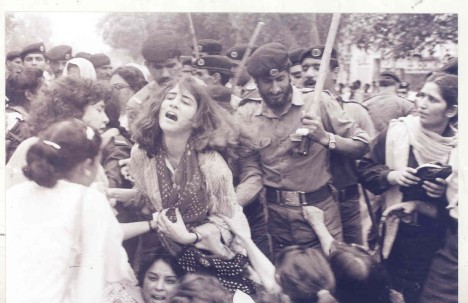

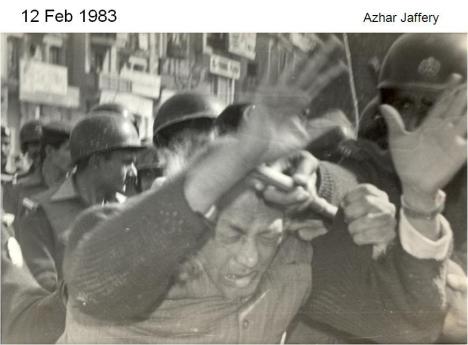
Reblogged this on Damsel In Dupattas.
LikeLike
Biggest fan of yours…
LikeLike
[…] working to restrict them, have both consistently gained strength since. Decades later, one can trace the path from the Pakistan women’s movement in its struggle against the Islamic laws affecting women’s […]
LikeLike